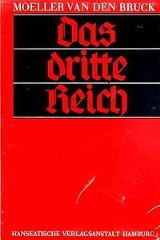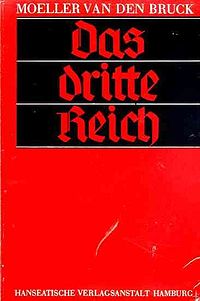
Das Dritte Reich
Encyclopedia

Germans
The Germans are a Germanic ethnic group native to Central Europe. The English term Germans has referred to the German-speaking population of the Holy Roman Empire since the Late Middle Ages....
author Arthur Moeller van den Bruck
Arthur Moeller van den Bruck
Arthur Moeller van den Bruck was a German cultural historian and writer, best known for his controversial book Das Dritte Reich...
, the ideology of which heavily informed the Nazi party. The book formulated an "ideal" of national empowerment, which resounded throughout a Germany desperate to rebound from the Treaty of Versailles
Treaty of Versailles
The Treaty of Versailles was one of the peace treaties at the end of World War I. It ended the state of war between Germany and the Allied Powers. It was signed on 28 June 1919, exactly five years after the assassination of Archduke Franz Ferdinand. The other Central Powers on the German side of...
: Das Dritte Reich was Germany's Third Rome
Third Rome
The term Third Rome describes the idea that some European city, state, or country is the successor to the legacy of the Roman Empire and its successor state, the Byzantine Empire ....
.
For Moeller van den Bruck, Germany's great misfortune lies in the political system created by the Weimar Republic
Weimar Republic
The Weimar Republic is the name given by historians to the parliamentary republic established in 1919 in Germany to replace the imperial form of government...
, one of competitive parties and liberal ideologies. An admirer of Benito Mussolini
Benito Mussolini
Benito Amilcare Andrea Mussolini was an Italian politician who led the National Fascist Party and is credited with being one of the key figures in the creation of Fascism....
, he looks for a strong leader.
The concept
His ReichReich
Reich is a German word cognate with the English rich, but also used to designate an empire, realm, or nation. The qualitative connotation from the German is " sovereign state." It is the word traditionally used for a variety of sovereign entities, including Germany in many periods of its history...
is not so much state in the sense that term is usually understood: it is the ideal condition, the only way in which the scattered German people can achieve a common purpose and destiny. But he does not look for the limited state, the Second Reich
German Empire
The German Empire refers to Germany during the "Second Reich" period from the unification of Germany and proclamation of Wilhelm I as German Emperor on 18 January 1871, to 1918, when it became a federal republic after defeat in World War I and the abdication of the Emperor, Wilhelm II.The German...
fashioned by Bismarck
Otto von Bismarck
Otto Eduard Leopold, Prince of Bismarck, Duke of Lauenburg , simply known as Otto von Bismarck, was a Prussian-German statesman whose actions unified Germany, made it a major player in world affairs, and created a balance of power that kept Europe at peace after 1871.As Minister President of...
was an imperfect empire. It did not include Austria
Austria
Austria , officially the Republic of Austria , is a landlocked country of roughly 8.4 million people in Central Europe. It is bordered by the Czech Republic and Germany to the north, Slovakia and Hungary to the east, Slovenia and Italy to the south, and Switzerland and Liechtenstein to the...
which survived on from "our First Empire
Holy Roman Empire
The Holy Roman Empire was a realm that existed from 962 to 1806 in Central Europe.It was ruled by the Holy Roman Emperor. Its character changed during the Middle Ages and the Early Modern period, when the power of the emperor gradually weakened in favour of the princes...
", side by side with "our Second Empire". Our Second Empire was a Little-German Empire which we must consider only as a stepping stone on our path to a Greater German Empire."
The weak Weimar Republic, he argues, will have to be replaced by a new revolution
Revolution
A revolution is a fundamental change in power or organizational structures that takes place in a relatively short period of time.Aristotle described two types of political revolution:...
, a revolution from the right. He looks also for a new political movement that will embrace both socialism
Socialism
Socialism is an economic system characterized by social ownership of the means of production and cooperative management of the economy; or a political philosophy advocating such a system. "Social ownership" may refer to any one of, or a combination of, the following: cooperative enterprises,...
and nationalism
Nationalism
Nationalism is a political ideology that involves a strong identification of a group of individuals with a political entity defined in national terms, i.e. a nation. In the 'modernist' image of the nation, it is nationalism that creates national identity. There are various definitions for what...
, a unique form of German Fascism
Fascism
Fascism is a radical authoritarian nationalist political ideology. Fascists seek to rejuvenate their nation based on commitment to the national community as an organic entity, in which individuals are bound together in national identity by suprapersonal connections of ancestry, culture, and blood...
. He takes all of his philosophical cues from the work of Nietzsche "who stands at the opposite pole of thought from Marx." The one contemporary politician he admires above all others is Benito Mussolini.
Implications
The temptation is to see this difficult little book as an advocate for what was to come; but this gap between the ideal vision and the historical truth is virtually unbridgeable. On the eve of publication Moeller van den Bruck inserted a preface, in which he wrote that "The Third Reich is a philosophical idea not for this but for the next world. Germany might perish because of the Third Reich dream." He believes Germany needs an ÜbermenschÜbermensch
The Übermensch is a concept in the philosophy of Friedrich Nietzsche. Nietzsche posited the Übermensch as a goal for humanity to set for itself in his 1883 book Thus Spoke Zarathustra ....
(Superman) in the fashion described by Nietzsche, but that Superman is not Adolf Hitler
Adolf Hitler
Adolf Hitler was an Austrian-born German politician and the leader of the National Socialist German Workers Party , commonly referred to as the Nazi Party). He was Chancellor of Germany from 1933 to 1945, and head of state from 1934 to 1945...
.
Soon after the collapse of the Munich Putsch he wrote: "There are many things that can be said against Hitler, and I have sometimes said them. But one thing you have to give him credit for: he is a fanatic for Germany. But he is wrecked by his proletarian primitive ways. He does not know how to give an intellectual basis to his Nazi party. Hitler is all passion, but lacks sense or proportion. A heroic tenor, not a hero." Hitler, in other words, was not Mussolini. These were the last words he ever wrote before his suicide in 1925.

